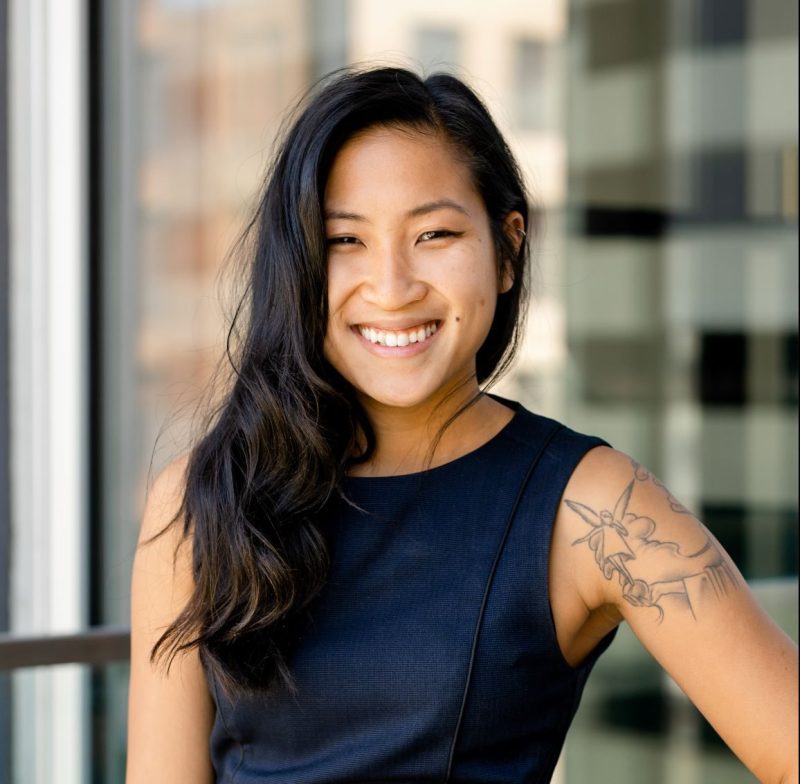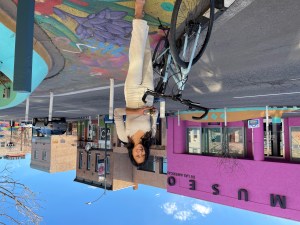Commentary: Cycling Towards Upward Mobility

This guest commentary is by Ann Nguyen, a landscape architect and planner with Otak and a member of the Bicycle Colorado RIDE Advisory Board. She is an avid bicyclist, car-free for almost a decade, and committed to providing safer streets and building awareness in her community through her lifestyle, work, and leadership roles. Denver Inter-Neighborhood Cooperation recently recognized Ann for her involvement in public service projects and equitable design solutions in West Denver. She is on Instagram at @annielethi and on LinkedIn.
My connection to bicycling began with walking or cycling to elementary and middle school in Savannah, Georgia, just as my cousins did near Quảng Ngãi, Vietnam, in a village where my father grew up. When I visited my cousins as a young teen, we gifted bicycles to my cousins. They were used to walking nearly 5 kilometers to and from school in their áo dài – traditional Vietnamese dress – sometimes alone. A bike allowed them to travel more safely. As a petite woman, to me pedaling feels safer than traveling on foot, but more importantly, it brings me freedom: freedom from being tied to a bus schedule, car payments, static traffic, or a confined route. This individual form of transport gives me a sense of self-sufficiency and symbolizes liberation from cultural barriers by simply choosing to travel differently. I ride to cross cultural gaps for social change, environmental justice, and my health. I ride to challenge the stereotype of who rides.
But I can just hear my aunts and mother.
“Cycling is not lady-like, won’t you arrive sweaty?”
“Well, that’s dangerous.”

“It’s probably because she can’t afford a car.”
For most immigrant and minority communities, bicycling is seen as lower class, a badge of poverty. This pervasive mindset and the physical lack of safe streets and nonexistent bicycle infrastructure in marginalized neighborhoods keep disadvantaged groups from viewing bicycling as a way to increase mobility and access to better health. It doesn’t help that bicycle advertisements often portray bicycling as an affluent recreational activity and not necessarily as a legitimate mode of transportation for commuting purposes.
Being different does not come without judgement from family and my community, so I am constantly justifying why I live the way I do. When you come from a place where people don’t expect of you or teach you how, it can feel lonely being the only woman or person of color in the room or on the trail. Told by the people I trust that I want too much or think too much, I started to detangle myself from the model minority myth and then began to understand the privilege and oppression that comes with my Asian identity. My given name, Ann, was meant to blend in and possibly an attempt to align with whiteness, but no one in my family calls me Ann.
I am American born, straddling between being an American and being the invisible other. Children of immigrants experience this role reversal of translating for our parents at the grocery store, doctor’s appointment, and awkward parent-teacher conferences at a young age. You grow up fast. It is our job to speak up for them, not just translate, because being docile and non-threatening has led us to disappear from the American narrative and be the faceless fetishized victims of someone’s “bad day.” I’ve spent the last weeks fluctuating between anger, heartache, and despair over the killings in Georgia, a place I call home. For me, it felt more personal than ever to see women who look like me fall victim to this hate crime and hyper-sexualized and who also had the same familiar stories – the same immigrant story of starting a life with no handouts, sharing bedroom floors with extended family members, and parents working so hard they barely saw their children.
Asians have been targeted for violence in this country for as long as there have been Asian immigrants in this country. After all, Asian people were brought here to replace slave labor. The violence during this pandemic has been emotional but not surprising. I was already feeling the rumblings from the steady uptick in racially motivated attacks and harassment since March 2020. I shrugged it off when a man spat at me while riding the Cherry Creek Trail. I had half a mind to turn around and confront him but decided otherwise with no one else braving the trail on that winter morning. I was discouraged from applying for a BIPOC opportunity in Steamboat to ride competitively for the first time because collective riders voiced disapproval of “being too woke” and questioned “Why do we need to reserve spots for them? Who’s stopping them from riding?” Suddenly, my vision of climbing a gravel road in the most scenic Colorado landscape with new friends quickly turned into an unwelcoming troop of Spandex-wearing middle-aged men judging me for taking space in their exclusive sport, mocking my amateur riding skills. My unreported discomforts were minor compared to what my family members and community were experiencing at home.
As the fatal shootings happened in Atlanta on March 16, I was in a safe space speaking to leaders in the Colorado bicycle community about how I feel invisible but also empowered to come together and fight for the common liberation in all minority communities. The day after the shootings, Colorado AAPI leaders held a virtual town hall meeting to share support and solutions to fight anti-Asian hate. Among the attendees were Denver Mayor Michael Hancock, Denver District Attorney Beth McCann, Colorado Attorney General Phil Weiser and leaders in the Asian, Latinx, Black and Jewish community coming together in solidarity in less than 24 hours after the brutal massacre. It gave me hope to be in a space with over 350 Coloradans who made me feel seen.
Do you have an idea for a guest commentary? Please fill out this form.
Support the nonprofit mission of Streetsblog Denver. Give $5 per month.


